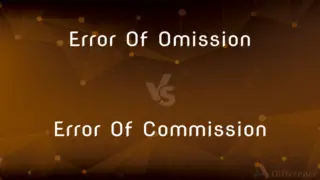Skepticism vs. Cynicism — What's the Difference?
By Tayyaba Rehman — Published on October 5, 2023
Skepticism questions the validity; Cynicism doubts the sincerity. Skepticism is doubting or questioning accepted beliefs; cynicism is a distrust of others' motives, often expecting the worst.

Difference Between Skepticism and Cynicism
Table of Contents
ADVERTISEMENT
Key Differences
Skepticism is an epistemological stance where individuals question or doubt the veracity of claims and beliefs. Cynicism, on the other hand, is a disposition characterized by mistrust, especially regarding others' motives or sincerity.
Skepticism is, thus, a methodology, a method of inquiring to reach the truth. In contrast, cynicism is more of an emotional disposition, often leading one to suspect insincerity or deceit.
Both skepticism and cynicism serve as defense mechanisms. However, the former defends against misinformation by seeking evidence, while the latter guards against being duped by presuming the worst in others. Skepticism, in essence, seeks clarity, while cynicism, at its core, anticipates duplicity.
It's noteworthy to mention that skepticism is not synonymous with disbelief. Instead, it demands adequate proof before accepting a claim. Cynicism, however, might reject a claim outright based on a belief that people are primarily driven by self-interest rather than acting in an honest or altruistic manner.
In a constructive light, skepticism can lead to better understanding and clearer thinking, acting as a tool for inquiry. In contrast, cynicism can sometimes protect one from deception but can also lead to a jaded and negative view of the world. To put it another way, skepticism encourages questioning, while cynicism promotes doubt.
ADVERTISEMENT
Skepticism and cynicism can be viewed on a continuum of doubt. While skepticism generally occupies a position of healthy doubt coupled with a desire to understand, cynicism is more about distrusting motives and expecting the worst from situations or people.
Comparison Chart
Nature
Methodology or approach
Emotional disposition
Concerns
Validity of claims
Sincerity of motives
Attitude
Questions with intent to understand
Distrusts assuming the worst
Result
Clearer thinking
Jaded view of the world
Relationship with belief
Requires evidence for belief
Often rejects based on mistrust
Compare with Definitions
Skepticism
A methodological approach to questioning claims.
Her skepticism led her to research before investing.
Cynicism
A belief that people are driven by selfish motives.
His cynicism made him doubt every act of kindness he encountered.
Skepticism
A philosophical doctrine suggesting certain knowledge is impossible.
Philosophical skepticism debates the limits of human understanding.
Cynicism
A disposition to believe the worst about people.
Growing up in a rough neighborhood instilled a deep cynicism in him.
Skepticism
Doubt concerning basic beliefs taken for granted by others.
His skepticism about popular narratives often made him the devil's advocate in discussions.
Cynicism
Mistrust in the sincerity or goodness of human actions.
She couldn't enjoy the charity event, clouded by her cynicism.
Skepticism
A defense against misinformation by seeking proof.
In the age of misinformation, skepticism is more crucial than ever.
Cynicism
Rejection of established norms and values.
Her cynicism towards societal standards made her an iconoclast.
Skepticism
The demand for evidence before accepting.
Due to his skepticism, he always fact-checks news articles.
Cynicism
A skeptical attitude toward a particular ideal or system.
His cynicism about politics kept him away from the voting booths.
Skepticism
Skepticism (American and Canadian English) or scepticism (British, Irish, Australian, and New Zealand English) is generally a questioning attitude or doubt towards one or more putative instances of knowledge which are asserted to be mere belief or dogma. Formally, skepticism is a topic of interest in philosophy, particularly epistemology.
Cynicism
An attitude of scornful or jaded negativity, especially a general distrust of the integrity or professed motives of others
The public cynicism aroused by governmental scandals.
Skepticism
A doubting or questioning attitude or state of mind; dubiety.
Cynicism
A scornfully or jadedly negative comment or act
"She arrived at a philosophy of her own, all made up of her private notations and cynicisms" (Henry James).
Skepticism
The ancient school of Pyrrho of Elis that stressed the uncertainty of our beliefs in order to oppose dogmatism.
Cynicism
Cynicism The beliefs of the ancient Cynics.
Skepticism
The doctrine that absolute knowledge is impossible, either in a particular domain or in general.
Cynicism
(uncountable) A distrustful attitude.
Skepticism
A methodology based on an assumption of doubt with the aim of acquiring approximate or relative certainty.
Cynicism
(uncountable) An emotion of jaded negativity, or a general distrust of the integrity or professed motives of other people. Cynicism can manifest itself by frustration, disillusionment and distrust in regard to organizations, authorities and other aspects of society, often due to previous bad experience. Cynics often view others as motivated solely by disguised self-interest.
Skepticism
Doubt or disbelief of religious tenets.
Cynicism
(countable) A skeptical, scornful or pessimistic comment or act.
Skepticism
The practice or philosophy of being a skeptic.
Cynicism
The doctrine of the Cynics; the quality of being cynical; the mental state, opinions, or conduct, of a cynic; morose and contemptuous views and opinions.
Skepticism
A studied attitude of questioning and doubt
Cynicism
A cynical feeling of distrust
Skepticism
The doctrine that absolute knowledge is not possible
Skepticism
A methodology that starts from a neutral standpoint and aims to acquire certainty though scientific or logical observation.
Skepticism
Doubt or disbelief of religious doctrines
Skepticism
An undecided, inquiring state of mind; doubt; uncertainty.
That momentary amazement, and irresolution, and confusion, which is the result of skepticism.
Skepticism
The doctrine that no fact or principle can be certainly known; the tenet that all knowledge is uncertain; Pyrrohonism; universal doubt; the position that no fact or truth, however worthy of confidence, can be established on philosophical grounds; critical investigation or inquiry, as opposed to the positive assumption or assertion of certain principles.
Skepticism
A doubting of the truth of revelation, or a denial of the divine origin of the Christian religion, or of the being, perfections, or truth of God.
Let no . . . secret skepticism lead any one to doubt whether this blessed prospect will be realized.
Skepticism
Doubt about the truth of something
Skepticism
The disbelief in any claims of ultimate knowledge
Common Curiosities
What is Skepticism?
Skepticism is an approach that questions the validity of claims and seeks evidence before acceptance.
What defines Cynicism?
Cynicism is a disposition of mistrust, especially suspecting the motives or sincerity of others.
Does Cynicism always reject positivity?
Not always, but cynicism tends to distrust motives, leading to skepticism about positive intentions.
Can someone be both a skeptic and a cynic?
Yes, one can question claims (skepticism) while also doubting motives (cynicism).
What's the origin of Cynicism?
Cynicism originated as a school of thought in ancient Greece, focusing on living in virtue and in accordance with nature.
How does Skepticism affect decision-making?
Skepticism encourages individuals to seek evidence and evaluate claims before making decisions.
Is Skepticism a negative trait?
Not necessarily. Skepticism can lead to clearer thinking and understanding, acting as a tool for inquiry.
Can Cynicism be constructive?
While cynicism can protect against deception, excessive cynicism may lead to a negative view of the world.
How does Skepticism relate to belief?
Skepticism doesn't denote disbelief but requires evidence for a belief.
Is Skepticism a form of doubt?
Yes, skepticism is a form of healthy doubt that seeks clarity through questioning.
Why do some people lean towards Cynicism?
Some believe cynicism protects them from deception, manipulation, or disappointment.
How does Cynicism relate to societal norms?
Cynics often challenge or reject established norms, questioning their sincerity or utility.
How might Cynicism influence interpersonal relationships?
Cynicism can strain relationships due to mistrust and anticipating negative motives in others.
Is Skepticism limited to scientific inquiry?
No, skepticism can apply to any claim, whether scientific, historical, or philosophical.
Can Skepticism be taught?
Yes, critical thinking and the scientific method are ways to nurture skepticism.
Share Your Discovery

Previous Comparison
Bait vs. Decoy
Next Comparison
Error Of Omission vs. Error Of CommissionAuthor Spotlight
Written by
Tayyaba RehmanTayyaba Rehman is a distinguished writer, currently serving as a primary contributor to askdifference.com. As a researcher in semantics and etymology, Tayyaba's passion for the complexity of languages and their distinctions has found a perfect home on the platform. Tayyaba delves into the intricacies of language, distinguishing between commonly confused words and phrases, thereby providing clarity for readers worldwide.










































